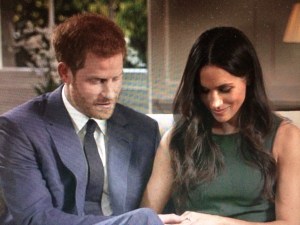 Sorry, couldn’t resist that. Cheap shot, I know. One shouldn’t propagate malicious rumours of Harry’s paternity, nor indeed point out his uncanny facial resemblance to a certain Guards officer.
Sorry, couldn’t resist that. Cheap shot, I know. One shouldn’t propagate malicious rumours of Harry’s paternity, nor indeed point out his uncanny facial resemblance to a certain Guards officer.
One can, however, exercise some restraint in expressing one’s otherwise overpowering elation at the news of the royal engagement.
It’s wonderful that this worthy young man and his pretty bride are passionately in love. The world is a better place whenever any man and any woman feel so deeply about each other.
There’s, however, a minor point. Meghan may be ‘any woman’, but Harry isn’t really ‘any man’. Prince Henry of Wales is fifth in the line of succession to the British throne.
That’s why the comment made by Meghan’s sister is so wide of the mark. “This isn’t about royalty,” she said. “It’s about love.” Royalty, not love, is precisely what this should be about, but one doesn’t expect an American to understand this.
For Meghan will be called upon to stop being just any woman and assume the responsibilities, along with the whole ethos, of a member of the royal family.
That’s no easy matter. I won’t bother you with a long rota of royal duties, but they all fall under one umbrella: submitting one’s own good to the good of the dynasty and therefore the realm.
The requisite skills can’t be picked up easily: they take serious training, ideally from a young age or, better still, birth. That’s why royals have traditionally married other royals, or at least members of high nobility: their spouses didn’t have to do an inordinate amount of training on the job.
Whenever our princes have ventured outside their own circle, the results have been rather mixed. For example, the experience of British royals marrying American divorcées of a certain age and uncertain past wasn’t an unqualified success. At least, unlike Wallis, Meghan is blessed with good looks, sunny personality and a smile that evokes nicer animals than snakes.
However, hacks singing hosannas to her don’t even realise how worried they make people who, like me, take our monarchy seriously. Thus, for example, the BBC:
“She is a campaigner with a variety of humanitarian interests and won’t want her marriage to limit her ability to speak out and support various causes – particularly those of gender equality.”
I’m afraid she’ll have to – of her own accord or under the express orders of older royals. I doubt they’ll want a member of their family to enlarge publicly on a raft of half-arsed progressivist causes, however strongly said member may feel about them privately.
Most things our royals say in public are pre-censored, which isn’t always a good thing. For example, I’d love to know how Her Majesty feels about being just another citizen of the EU, Liz Windsor.
But I certainly don’t want to know what Meghan thinks about ‘gender equality’ even in her present capacity, never mind as the Duchess of Sussex. And I especially fear that, by expressing herself with a distinctly American lack of inhibitions, she’ll do even more damage to the dynasty than Harry’s sainted mother did.
Richard Kay, who knew Diana well, put it in a nutshell: “Diana would have been thrilled – Meghan’s just the kind of woman she wanted to be,” he wrote in the spirit of jubilation.
Quite. That’s exactly the problem. For Diana was, and always wanted to be, an utterly modern, and therefore brainless, woman, who was both unable and unwilling to make the ultimate sacrifice of self-denial I mentioned earlier.
Rather than conforming to the traditional standards of British royalty, she wanted the royal family to go along with every modern perversion she espoused, solipsism being the principal one. When they wouldn’t, she consciously set out to do as much harm to the monarchy as she possibly could, using every weapon at her disposal, mostly of a sexual nature.
That deprived the dynasty of much of its dignity, dragging it into the mire inhabited by sleazy tabloids and their readers. And dignity is the most prized asset of the royals, now they’ve been regrettably deprived of any executive power.
Fair enough, Lady Diana Spencer wasn’t a commoner. But she was common, which is why she couldn’t understand the key constitutional role she was supposed to play in British polity.
This role precludes fixation on the present and its fads. The monarchy’s job is to provide the axis around which the entire history of the country revolves. It links the past with the present and the future, establishing the nation’s organic continuity.
This is a solemn and vital mission, which becomes much more difficult when royals begin to star in gossip columns. Photographs of Diana with her numerous lovers or of a topless Fergie having her toes sucked by athletic Americans jeopardised that mission no end.
Even Kate, who’s doing her best to learn what it means to be a royal, has added her own pinpricks. Eleanor of Aquitaine might have ridden bare-chested in front of the Crusaders’ hosts, but I for one would rather have been spared the sight of our future queen appearing topless in French tabloids.
According to Dominic Sandbrook, “we ought to remember that monarchy is nothing if not a spectacle.” This is a self-fulfilling prophecy, and a hare-brained one at that.
Implied there is a circuitous argument: if monarchy is but a show, a professional actress should do the job famously. However, one may harbour doubts precisely because monarchy, for all its pomp and circumstance, isn’t a spectacle. Mr Sandbrook should really take the trouble of pondering our constitution.
Sorry to be a spoilsport, but a massive outburst of public enthusiasm is always suspect, especially when its cause is far from being unambiguous. The term ‘Dianification’ isn’t particularly mellifluous, but it describes the phenomenon quite accurately.